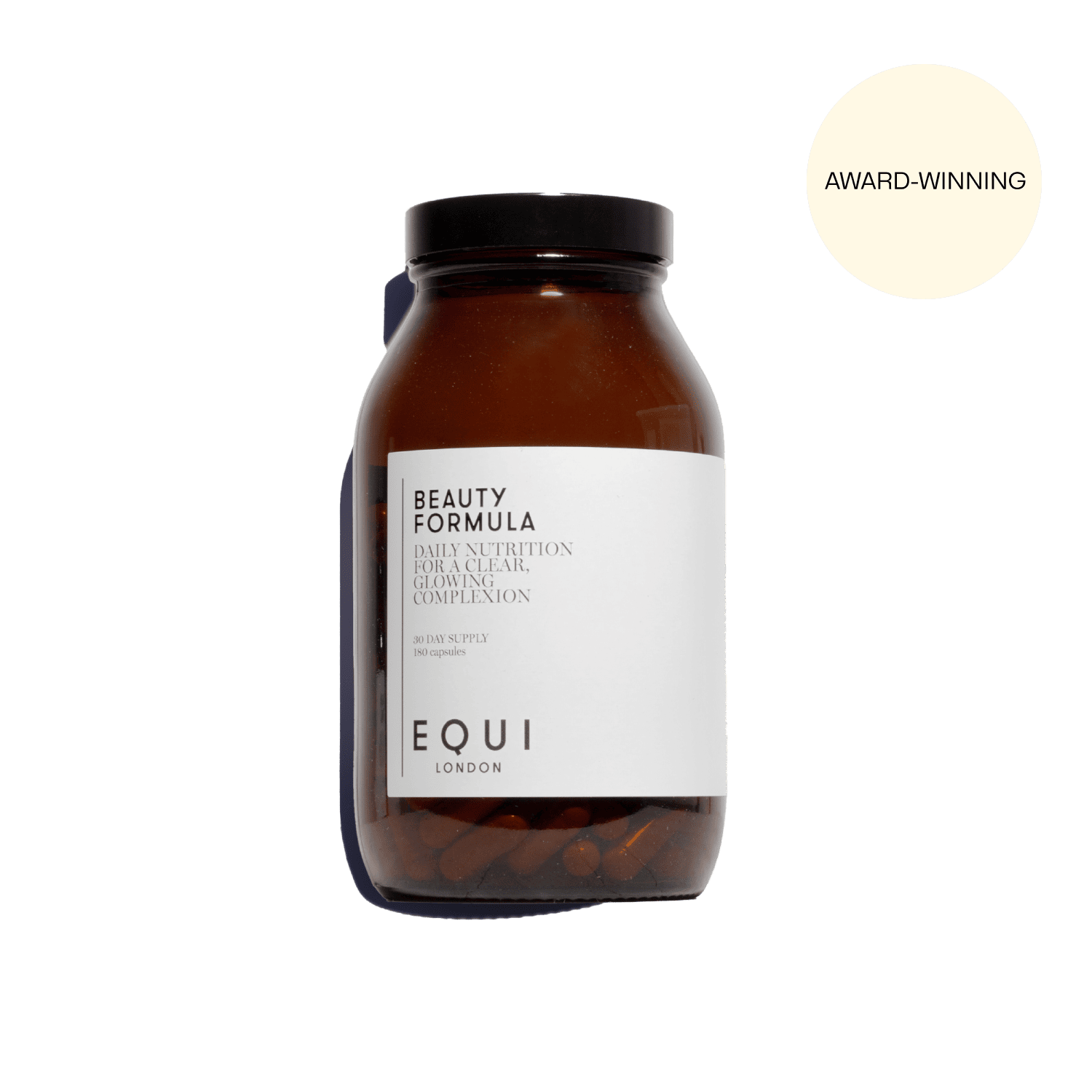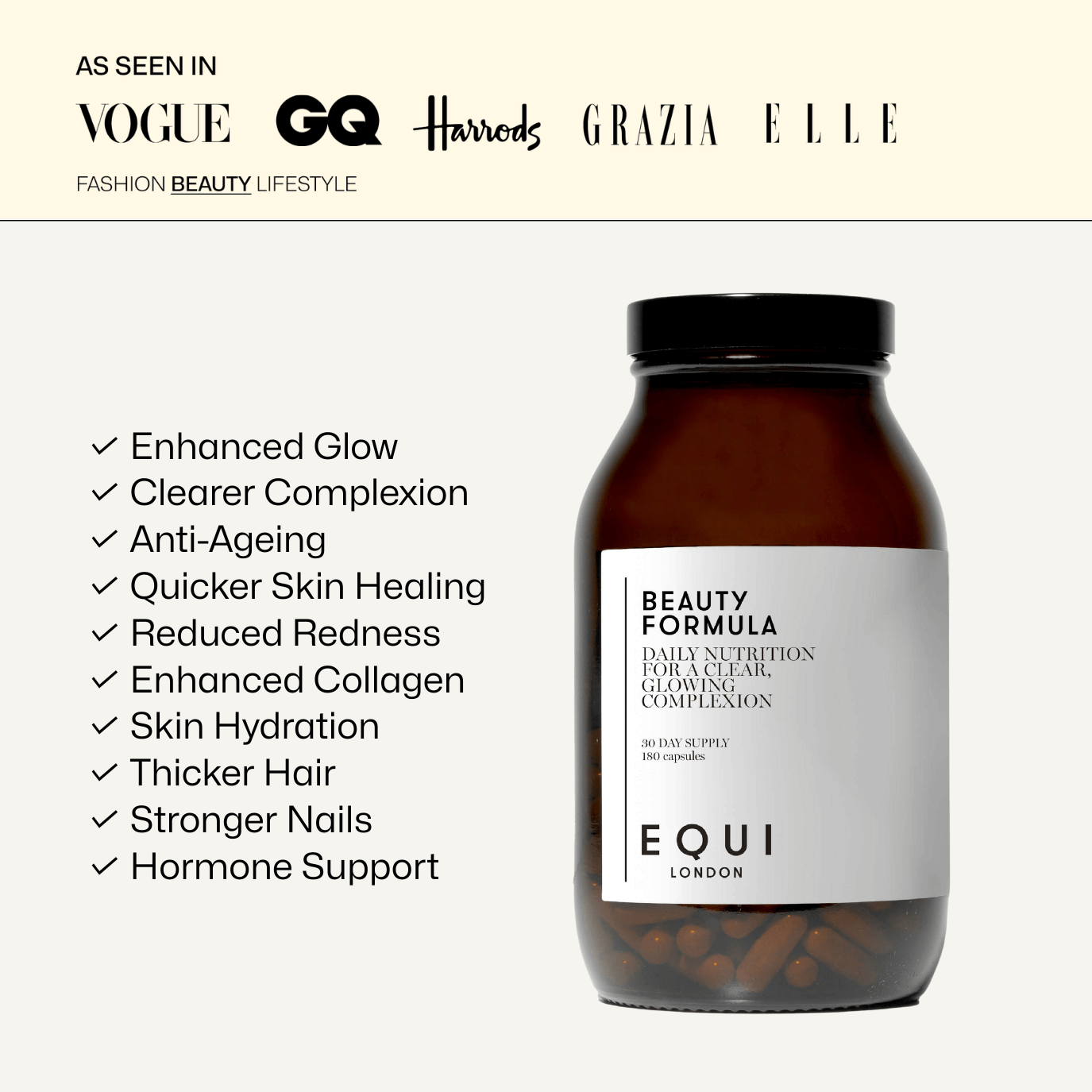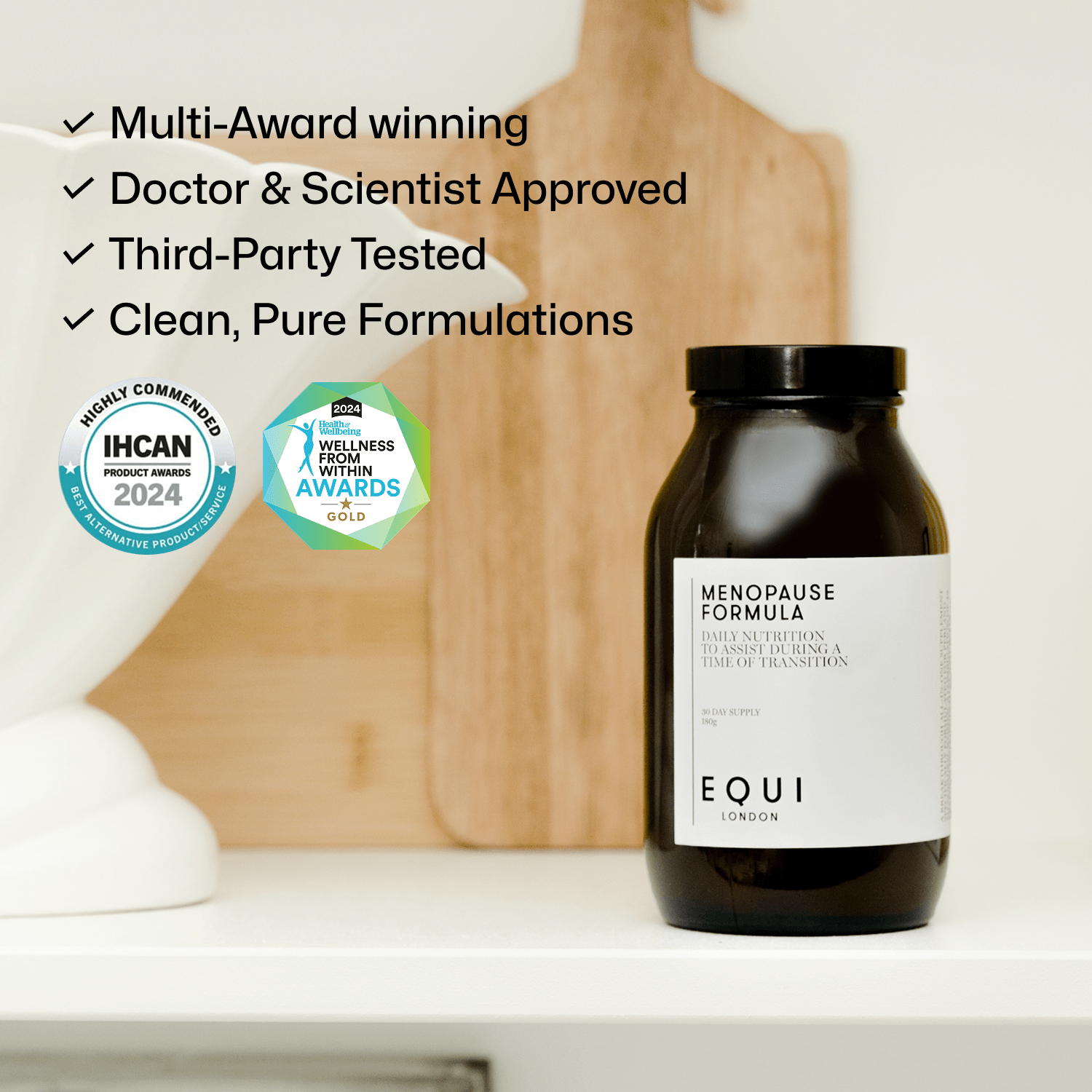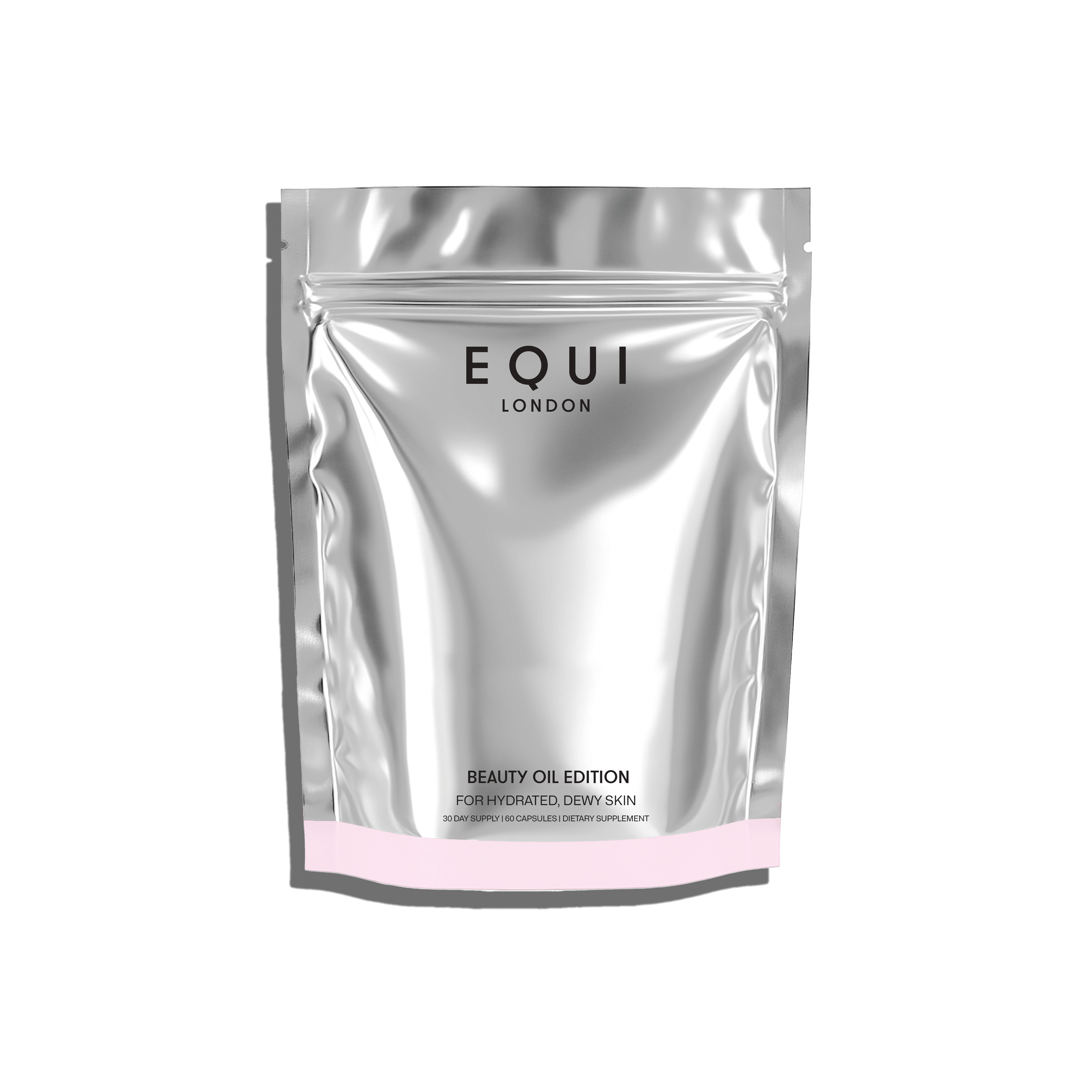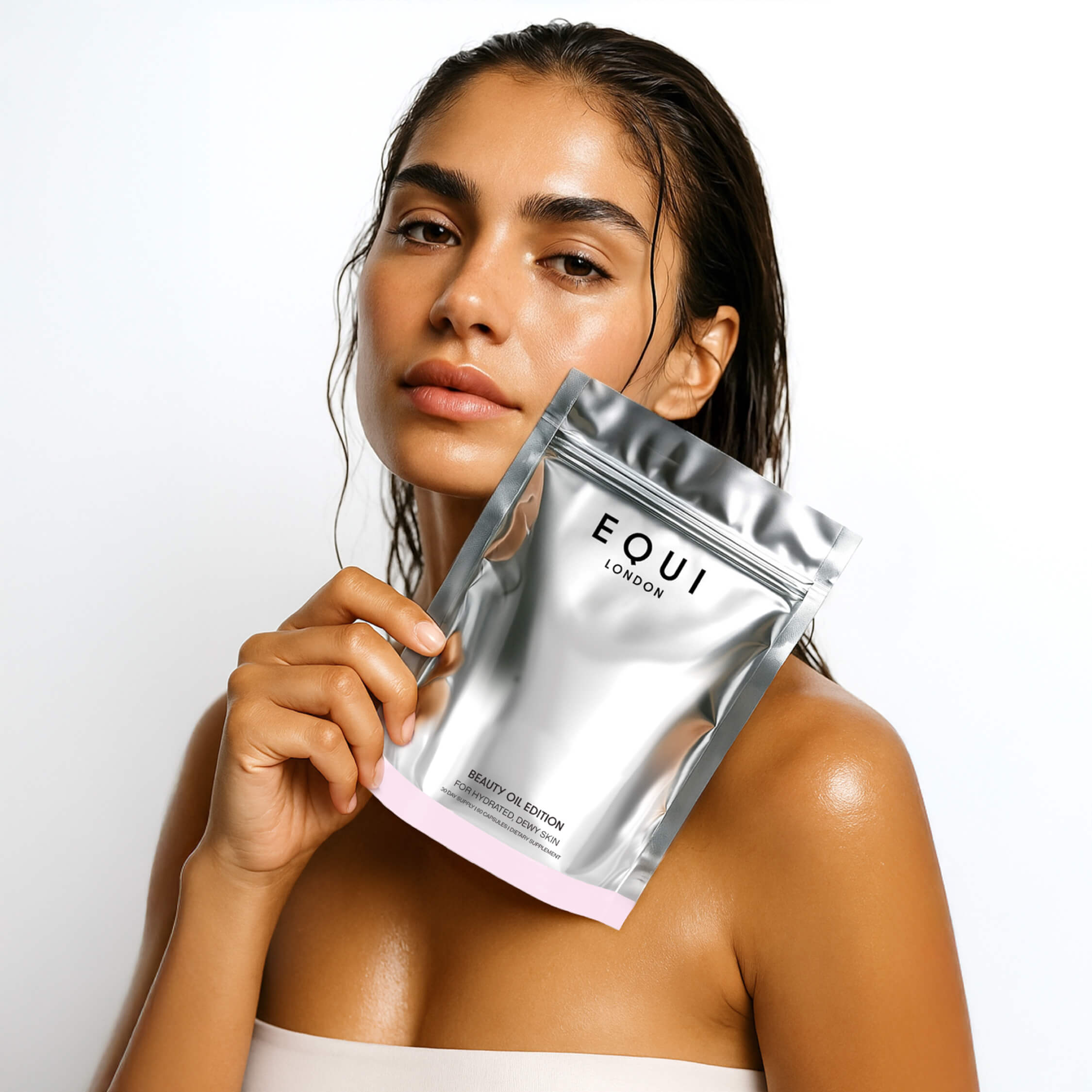
Water, our most abundant resource, is often overlooked when it comes health and beauty. Yet, its significance is immeasurable. For us at EQUI, water is more than just a thirst quencher—it's the foundation of vitality and youthful glow. Welcome to “The Power of Hydration,” where we investigate the therapeutic wonders of water and how it intertwines with our very own Beauty Formula to amplify your health and wellness journey. Beauty Formula provides total body support from hormones to digestion, addressing the underlying causes of problem skin, whilst supplementing your body with everything it needs to stay hydrated and glow.
Every cell, tissue, and organ in our body relies on water to function correctly. Think of it as nature's multitasker: it regulates body temperature, lubricates joints, aids digestion, and supports the detoxification pathways in our liver and kidneys. Not to mention, its vital role in transporting nutrients and oxygen to cells, ensuring they operate at peak performance. Beyond these crucial physiological functions, water plays an instrumental role in maintaining the suppleness and glow of our skin—the body's largest organ. The skin, composed of nearly 64% water, is a direct reflection of our hydration status. When we're well-hydrated, our skin appears plump, radiant, and less prone to the visual signs of ageing. Whilst dehydration can leave skin looking dull, flaky, and more susceptible to wrinkles.
The modern-day hustle and bustle often distract us from the simple act of drinking water. Coffee, soft drinks, and energy drinks dominate our desks and car cup holders, side lining the H2O. Moreover, external factors like air conditioning, heating, and environmental pollutants further exacerbate the dehydration dilemma. However, while hydrating from the inside out is undeniably essential, the efficacy of hydration can be significantly amplified when coupled with specific nutrients and compounds. Enter Beauty Formula—a carefully curated blend of 48 of the most effective nutritional compounds proven to combat skin concerns, support collagen and hydration levels and strengthen hair and nails, offering a holistic approach to wellness and beauty. We will unravel how water, combined with the potent ingredients in Beauty Formula, can accentuate your health, wellness, and skin radiance. Together, they form a dynamic duo that not only quenches your cellular thirst but also elevates your beauty regimen.
The Biological Necessity of Hydration
Water, accounting for about 60% of an adult human's body weight, is more than just a mere component; it is the fundamental medium that facilitates nearly all of the body's physiological processes. Its essentiality is underscored by the multifaceted roles it plays in our body's many functions including:
Nutrient Transportation - Every cell in our body requires a variety of nutrients for proper function and growth. Water plays a vital role in the absorption of these nutrients from the food we consume. Once absorbed, these nutrients are dissolved in the bloodstream, which is primarily made up of water. This allows for efficient transportation of nutrients to every nook and cranny of our body, ensuring that each cell receives the nourishment it needs to thrive (1).
Waste Elimination - Our cells generate metabolic waste, a natural by-product of cellular processes. Water acts as the chief transport medium for these waste products, aiding in their elimination from the body through urine, sweat, and bowel movements. The kidneys, in particular, rely on adequate hydration to filter out toxins and excrete them in the form of urine (2). Ever noticed the colour of your wee first thing can be very different to later in the day? It’s related to how hydrated you are, so take note of your wee colour!
Cellular Function - Cellular activities, from DNA replication to energy production, occur in aqueous environments. Water provides the medium for biochemical reactions to take place, ensuring that cells function optimally. Additionally, cellular structures, such as proteins and enzymes, maintain their shape and function in the presence of adequate water (3) so even at the smallest cellular level, hydration is key and without it, cells won’t work efficiently!
Temperature Regulation - Our body has a built-in thermostat that ensures we maintain a consistent internal temperature and water plays a pivotal role in this regulation. It has a high heat capacity, meaning it can absorb and release a large amount of heat without undergoing significant temperature changes. When we're hot, we sweat, releasing water onto the skin's surface. As this sweat evaporates, it cools the body down. This built-in cooling mechanism is crucial for maintaining homeostasis, especially during physical exertion or hot weather (4). So, by consuming enough water, you can be sure that your body’s temperature control system is ready to step in when needed.
What Happens When We’re Dehydrated?
The delicate balance of processes in the body that rely on water can be disrupted by dehydration. Even mild dehydration can have pronounced effects on the body's metabolic rate! Reduced water intake can lead to less excretion of fluids to conserve water, but also causes reduced elimination of metabolic wastes, which may become stored in the body instead. Moreover, dehydration can lead to a reduction in the volume of plasma, the liquid component of our blood, making the blood thicker. This can subsequently lower the efficiency of nutrient and oxygen delivery to cells, potentially leading to low energy and fatigue (5). Furthermore, dehydration has been associated with diminished metabolic rates, which can have cascading effects on energy consumption and weight management. When the body's water content is not replenished adequately, there can be a reduction in the thermogenesis process, which is crucial for burning calories. Consequently, dehydration could potentially contribute to weight gain or impede weight loss efforts (6). So, water isn't just a component of our system; it's the very essence of life-supporting functions at every level. Ensuring optimal hydration is, therefore, a foundational step towards holistic health and wellbeing.
Hydration Supports a Radiant Glow
The skin, our body's largest organ, is a reflection of our inner health and hydration status. While it acts as a barrier, shielding us from the external environment, it's also deeply influenced by our internal hydration levels. Maintaining optimal hydration is essential for the skin's health, vibrancy, and ability to combat the signs of ageing. One of the most noticeable attributes of well-hydrated skin is its elasticity. Elasticity refers to the skin's ability to return to its original state after being stretched. Dehydrated skin loses its pliability, becoming less supple and more susceptible to wrinkling. Adequate hydration also ensures the skin remains moisturised, preventing dryness and flakiness. When skin cells are well-hydrated, they swell, giving the skin a firm and youthful appearance. One study affirmed that higher water intakes positively impacted skin hydration and physiology (7). So if you suffer with dry skin conditions, consider upping your water intake. Secondly, hydration plays an integral role in the skin's resilience against ageing. As we age, our skin's natural ability to retain moisture diminishes, making hydration even more crucial. Hydrated skin displays fewer lines and wrinkles, as the plumpness resulting from the water reduces the appearance of these lines. Furthermore, well-hydrated skin supports optimal barrier function, preventing the external environmental factors, which can accelerate ageing, from wreaking havoc (8). Whilst facial creams and moisturisers may hydrate skin superficially from the outside, it’s what we do from the inside out that really matters – drinking adequate water can make all the difference.
Our skin is also a significant detoxification organ. Through sweat, skin releases toxins and waste products, and for this to work optimally, adequate hydration is essential. Regular water consumption ensures efficient toxin elimination, reducing the burden on other detoxifying organs like the liver and kidneys. This detoxification process, facilitated by H2O, is critical for maintaining clear skin. Accumulated toxins can lead to breakouts and a dull complexion. In fact, one study discovered that increased water intake in individuals with low initial daily water consumption led to significant reductions in the severity of their acne (9). Whilst our sebaceous glands produce oil (sebum) that naturally moisturises and protects our skin, when the skin is dehydrated, it can cause these glands to overproduce sebum, leading to an oily complexion and clogged pores - prime conditions for acne breakouts. By ensuring that the skin is adequately hydrated, we can help balance sebum production, thereby reducing the chances of breakouts and acne. So, the quest for radiant, youthful, and clear skin is intricately tied to our hydration levels. The saying that beauty comes from within really does ring true. Ensuring that we provide our bodies with ample hydration not only benefits our internal organs and systems but also manifests externally, blessing us with vibrant, resilient skin.
Beauty Formula: The Hydration Boost Your Skin Deserves
While drinking water is foundational, it's the microscopic interactions at the cellular level that truly decide how plump, radiant, and resilient our skin appears. Beauty Formula, a blend of the most effective nutritional compounds is precisely crafted to boost these cellular interactions and aid in deep hydration, boasting key ingredients like hyaluronic acid, magnesium, B6, milk thistle, alpha lipoic acid, and probiotics. Let’s take a closer look at how:
Hyaluronic Acid (HA) - HA is a natural substance in our skin that has a stunning capacity to attract and hold vast amounts of moisture. Its moisture-binding characteristic is exceptionally important when it comes to skin ageing, as it can enhance skin's elasticity and resilience. One study highlighted that HA can retain an amazing 1000 times its weight in water within the skin cells, making it an unparalleled hydrating agent! (10).
Magnesium - An essential mineral, magnesium plays a crucial role in a myriad of biochemical reactions in the body, including those that support skin structure. It plays a role in maintaining adequate hydration levels by balancing electrolyte content (11). Not only this, but magnesium aids protein synthesis, helping to fortify the structural integrity of the skin, maintaining its youthful and supple appearance.
Vitamin B6 - Integral to over 100 enzyme reactions in the body, vitamin B6 is a powerhouse. A deficiency can lead to dryness, and an increased production of sebum, making its supplementation beneficial for maintaining skin hydration and health. What’s more, it helps aid the production of collagen, essential for skin's elasticity.
Milk Thistle - Known for its liver-supporting properties, milk thistle benefits hydration levels and the skin. By enhancing liver function, milk thistle can improve skin's hydration status (12). Plus, a healthy liver can effectively remove toxins, which, when accumulated, can lead to skin issues like acne and dehydration.
Alpha Lipoic Acid (ALA) - This powerful antioxidant supports skin by defending it against free radicals. These radicals can degrade collagen and elastin fibres, making the skin look dull and dehydrated. ALA, by countering these effects, ensures skin remains hydrated and retains its youthful bounce.
Vegan Probiotics - The probiotics present in Beauty Formula, specifically Lactobacillus sporogenes (also known as Bacillus coagulans), Bifidobacterium bifidum, and Bifidobacterium longum, have shown potential in supporting hydration. For instance, a healthy gut lining aids in the absorption of water and electrolytes from food and drinks. Research shows that B. bifidum and B. longum enhance the intestinal barrier function, facilitating more efficient fluid uptake (13). Moreover, a balanced gut microbiota, achieved with these probiotics, can prevent inflammatory responses that might disrupt fluid balance (14).
Superberry Bilberries - Bilberries, rich in antioxidants, can be influential in supporting cellular hydration. The anthocyanins present in bilberries are known for their ability to improve blood vessel elasticity and microcirculation (15). This, in turn facilitates the delivery of water and nutrients to cells, promoting cellular hydration (16). Additionally, the anti-inflammatory properties of bilberries may reduce water retention and bloating, ensuring that body fluids are properly balanced and distributed (17).
Incorporating Beauty Formula into your skincare regimen provides the skin with a holistic blend of ingredients essential for maintaining and boosting hydration. Not only do these ingredients work at the microscopic level, ensuring cells are well-nourished and hydrated, but their cumulative effect also reflects externally. The skin looks more vibrant, feels softer, and remains resilient against daily stressors. Beauty Formula isn't just about surface-level beauty; it's about deep, cellular nourishment and hydration that ensures skin not only looks good but feels and functions at its best. Purchase Beauty Formula here.
Foods That Increase Hydration
When we think of hydration, the first image that likely pops into our mind is water. But did you know that we can consume our water through what we eat too? Several foods are water-dense, offering not just hydration but also a plethora of vitamins and minerals that aid in the body's hydration processes. On the other hand, certain foods and beverages may stealthily drain our bodies of essential fluids.
Hydration Superstars:
Cucumbers - Containing a whopping 95% water content, cucumbers are an excellent snack to keep dehydration at bay. Additionally, they are a rich source of antioxidants that combat free radicals, ensuring the skin remains fresh and hydrated (18). Cucumbers make a great crudité and can be accompanied with some protein-packed houmous.
Strawberries - With about 91% water content, these juicy berries are not just tantalisingly delicious but also high in antioxidants, fibre, and vitamin C, fortifying cellular hydration and overall health (19). When out of season, opt for frozen strawberries and add to smoothies, overnight oats, or yoghurt for a tasty and refreshing breakfast option.
Spinach - This leafy green has around 92% water content. Apart from hydration, it’s also rich in magnesium, potassium, and vitamin K, all of which support optimal cellular fluid balance. Get in your greens daily by opting for a green juice instead of your morning coffee and always keep a bag of frozen spinach to add to homemade soups, stews and curries.
Watermelon - A summertime favourite, watermelon has a 91% water content and contains vital rehydration salts like calcium, magnesium, potassium, and sodium that can hydrate the body more effectively than water alone (20).
Courgette - Another hydration superstar, courgette is composed of 94% water and also provides a good source of fibre, promoting digestive health (21). Eating these raw will mean you are obtaining all their hydrating benefits - add them to smoothies for an extra hydration boost.
What To Avoid:
Caffeinated Beverages - While the diuretic effect of caffeine is often exaggerated, excess caffeine can lead to increased urine production, promoting dehydration, especially when consumed in large quantities (22). Stick to 1-2 caffeinated drinks per day and be conscious of other sources such as tea and dark chocolate.
Salty Snacks - Foods high in sodium can lead to increased thirst. Excess salt causes the body to need more fluids to help clear out the sodium from the kidneys. Moreover, overconsumption might result in water retention, giving a feeling of bloating. We do need a little salt in the diet which you can get from eating salty foods such as olives, pickled foods and tamari (soy sauce) but go easy on the processed salty snacks if you want to stay hydrated!
Alcoholic Beverages - Alcohol is a diuretic, meaning it pushes fluids out of the body. When someone drinks more fluids than they take in, they can become dehydrated (23). For more of the science on alcohol and its effects on the body as well as hints and tips on how to reduce hangovers and aid recovery, head to our recent blog.
Protein-rich Foods - High-protein diets might result in increased water loss as the body uses up more water to eliminate the by-products of protein digestion. Counteract this by pairing lean protein like chicken or fish with hydrating foods such as a salad using spinach, cucumber, and tomatoes.
So, while the saying of drinking eight glasses of water daily is still valid, incorporating water-rich foods can be a tastier, enriching alternative to boost hydration. However, mindful consumption of dehydrating foods and beverages is crucial to maintain the body’s fluid balance! Proper hydration supports overall health, keeping the skin radiant, aiding digestion, and ensuring that cells function optimally.
10 Top Tips to Stay Hydrated
- Optimal Daily Intake - Aim for the general guideline of drinking around 8 glasses or 2 litres a day. But remember, individual needs vary, and factors like climate and physical activity can influence this. Keep a track of how much you sweat and increase water consumption accordingly.
- Little & Often - Instead of gulping down large amounts sporadically, try sipping smaller amounts throughout the day. This helps your body to maintain a steady hydration level, holding onto water and sending it where it’s needed.
- Take Beauty Formula at Breakfast - Taking Beauty Formula with your first meal of the day can aid hydration. The nutrients present such as hyaluronic acid, B6, and magnesium enhance water absorption, ensuring you start your day on a hydrated note. Not only that, but this award-winning formula provides total body support from hormones to digestion, addressing the underlying causes of problem skin, whilst supplementing your body with everything it needs to glow.
- Exercise Intensity Matters - For low-intensity workouts, an additional 500ml-1L should suffice. However, during more intense cardio sessions, aim for 1-2 extra litres to compensate for the additional fluid loss (24). Be guided by how thirsty you feel, your wee colour and how much you have sweated during your workouts too – remember everyone is an individual!
- Optimise Your Workouts – Don’t just wait until after your workout to increase your water intake. Drink some water 20-30 minutes before your workout, sip during (especially if it's intense or long-lasting), and ensure you rehydrate post-exercise to replace fluids lost (25).
- Counteract Caffeine - While tea and coffee have hydrating aspects, they also act as diuretics. For every cup consumed, consider adding an additional 200ml of water to your daily intake (26), this is the equivalent to a small glass of water.
- Choose Glass or Metal - Plastic bottles (even those that are BPA free) may leach chemicals, especially when exposed to heat. Glass or metal bottles are more eco-friendly and safer for repeated use so go for these options to stay hydrated safely!
- Sauna Sessions - While saunas promote detoxification through sweat, they also lead to fluid loss. Ensure you're well-hydrated before entering a sauna, sip water during your session, especially if you're in for extended periods, and don’t forget to rehydrate post-sessions.
- Mealtime Hydration - Drinking a glass of water with meals can aid digestion but be mindful not to drink excessive amounts as it might dilute stomach acid, affecting digestion. Aim for no more than a small glass with meals, which should suffice if you have been sipping water regularly throughout the day.
- Night-time Considerations - While it's essential to be hydrated, try to minimise excessive water intake at least 1-2 hours before bedtime. It can disrupt sleep due to night-time bathroom visits.
Always listen to your body! Thirst, dark yellow urine, and a dry mouth are indicators that you might need to up your water game. Staying informed and attuned to your body's signals is the best way to stay optimally hydrated.
References
-
Micha, R. et al., (2017). Association Between Dietary Factors and Mortality from Heart Disease, Stroke, and Type 2 Diabetes in the United States. JAMA. 317(9), pp. 912-924
-
Clark, W.F. et al., (2011). Urine volume and change in estimated GFR in a community-based cohort study. Clin J Am Soc Nephrol. 6(11), pp. 2634-41.
-
Edmonds, C.J. et al., (2013). Subjective thirst moderates changes in speed of responding associated with water consumption. Frontiers in Human Neuroscience. 7, p.363
-
Armstrong, L.E. et al., (2012). Mild dehydration affects mood in healthy young women. The Journal of Nutrition. 142 (2), pp. 382-8
-
Popkin, B.M. et al., (2010). Water, hydration, and health. Nutrition Reviews. Pp. 439-458
-
Dennis, E.A. et al., (2015). Water Consumption Increases Weight Loss During a Hypocaloric Diet Intervention in Middle-aged and Older adults. Obesity. 18 (2), pp. 300-307
-
Palma, L. et al., (2015). Dietary water affects human skin hydration and biomechanics. Clinical, Cosmetic and Investigational Dermatology. 8, pp. 413-421
-
Ebling, F.J., (2013). Ageing and the skin. Postgraduate Medical Journal.
-
Rodrigues, L. et al., (2013). Involvement of free radicals in the skin neurogenic inflammation induced by mechanical trauma in mice. European Journal of Pain.
-
Papakonstantinou, E., Roth, M., & Karakiulakis, G., (2012). Hyaluronic acid: A key molecule in skin aging. Dermato-endocrinology. 4 (3), pp. 253-258
-
Grober, U., Schmidt, J., & Kisters, K., (2015). Magnesium in prevention and therapy. Nutrients. 7 (9), pp. 8199-8226
-
Vessal, G. et al., (2010). Silymarin and milk thistle extract may prevent the progression of diabetic nephropathy in streptozotocin-induced diabetic rats. Renal Failure. 32 (6), pp. 733-9
-
Guglielmetti, S., Mora, D., Gschwender, M., & Popp, K. (2011). Randomised clinical trial: Bifidobacterium bifidum MIMBb75 significantly alleviates irritable bowel syndrome and improves quality of life ‐ a double‐blind, placebo‐controlled study. Alimentary Pharmacology & Therapeutics, 33(10), pp. 1123-1132.
-
Cani, P. D., & Knauf, C. (2016). How gut microbes talk to organs: The role of endocrine and nervous routes. Molecular Metabolism, 5(9), pp. 743-752.
-
Zafra-Stone, S., Yasmin, T., Bagchi, M., Chatterjee, A., Vinson, J. A., & Bagchi, D. (2007). Berry anthocyanins as novel antioxidants in human health and disease prevention. Molecular Nutrition & Food Research, 51(6), pp. 675-683.
-
Krikorian, R., Shidler, M. D., Nash, T. A., Kalt, W., Vinqvist-Tymchuk, M. R., Shukitt-Hale, B., & Joseph, J. A. (2010). Blueberry supplementation improves memory in older adults. Journal of Agricultural and Food Chemistry, 58(7), pp. 3996-4000.
-
Mauray, A., Milenkovic, D., Besson, C., Caccia, N., Morand, C., Michel, F., ... & Scalbert, A. (2010). Bilberry anthocyanin-rich extract alters expression of genes related to atherosclerosis development in aorta of apo E-deficient mice. Nutrition, Metabolism and Cardiovascular Diseases, 20(8), pp. 577-585.
-
Mukherjee, P.K. et al., (2013). Phytochemical and therapeutic potential of cucumber. Fitoterapia. 84, pp. 227-36
-
Giampieri, F. et al., (2015). Strawberry as a health promoter: an evidence-based review. Food & Function. 6 (5), pp. 1386-98
-
Tarazona-Díaz, M.P. et al., (2013). Watermelon juice: potential functional drink for sore muscle relief in athletes. Journal of Agricultural and Food Chemistry. 61 (31), pp. 7522-8
-
Martínez-Valdivieso, D. et al., (2017). Role of zucchini and its distinctive components in the modulation of degenerative processes: Genotoxicity, anti-genotoxicity, cytotoxicity, and apoptotic effects. Nutrients. 9 (7), p. 755
-
Killer, S.C. et al., (2014). No evidence of dehydration with moderate daily coffee intake: a counterbalanced cross-over study in a free-living population. PLOS ONE. 9(1): e84154
-
Shirreffs, S.M. & Maughan, R.J., (2006). The effect of alcohol on athletic performance. Current Sports Medicine Reports. 5(4), pp. 192-6.
-
Sawka, M. N., Burke, L. M., Eichner, E. R., Maughan, R. J., Montain, S. J., & Stachenfeld, N. S. (2007). American College of Sports Medicine position stand. Exercise and fluid replacement. Medicine and science in sports and exercise, 39(2), pp. 377-390.
-
Shirreffs, S. M. (2003). The optimal amount of fluid to drink. European Journal of Clinical Nutrition, 57, S24-S29.
-
Maughan, R. J., & Griffin, J. (2003). Caffeine ingestion and fluid balance: a review. Journal of human nutrition and dietetics, 16(6), pp. 411-420.
